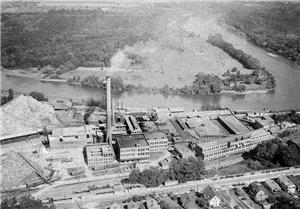On February 9, 1974, a crowd gathers in Lowell (part of Everett) to witness and record the historic finale to pulp and paper production in the town. The demise of this industry in Lowell is noted with the dynamiting of the Lowell Paper Mill's smokestack. The area is covered in fog that day, making the smokestack nearly invisible. The explosion adds a cloud of smoke that quickly merges with the fog.
The Lowell Paper Mill
When Washington became a state in 1889, Lowell pioneer E. D. Smith (1837-1909) was quick to capitalize on the potential for growth and began expanding his own operations in Lowell. By this time he owned nearly 5,000 acres of land, part of which was on the peninsula that would soon become Everett. Smith sold 1200 acres to the Everett Land Company, a group of wealthy investors that included John D. Rockefeller (1839-1937). Smith then donated 500 acres in Lowell to the Land Company, designating that it be used for industry. He then negotiated with Tacoma lumberman and Everett developer Henry Hewitt Jr. (1840-1918) to establish a $400,000 paper mill (Puget Sound Pulp and Paper Company) at the Lowell site. The paper mill was one of four major industries upon which the Everett development was initially built. While the other three had short lives, the Everett Pulp and Paper Mill continued for more than 80 years, closing in the early 1970s.
The paper mill was Lowell’s economic center. Many Lowell residents were mill workers and, over the decades, paper mill executives such as William Howarth (1864-1937) and Howarth’s successor William Pilz (1887-1953) were considered to be generous philanthropic men who earned much community respect. A story lingers that when John D. Rockefeller divested himself of his interests in the Everett area, he kept the paper mill running solely due to his respect for Mr. Howarth, who he put in charge (Anson Moody).
A Good Place to Work
Although the company was not unionized until the 1930s, workers before that time still considered it to be a “good place to work” (Angelo Canonica). Over the years the smokestack was modified and company name changed: Puget Sound Pulp and Paper Company became the Everett Pulp and Paper Company in the early 1900s and then in the 1955 it was called Simpson Paper Company and later Simpson-Lee Paper Company. But under any name, residents of Everett and Lowell usually called it the Lowell Paper Mill.
Everett Public Library librarian and Lowell historian Hazel Clark attended the ceremonial dynamiting and left this account:
“On February 9, 1974, the old smokestack which had been a landmark towering above the skyline for at least 50 years was to have a big farewell party when it was to be dynamited. The morning of February 9 dawned — dull, gloomy and with a dense fog, but even then the hillsides and streets in Lowell were swarming with onlookers armed with cameras, to await the heralded dynamiting. Unfortunately the fog didn’t lift, and only the thud of the blast, the shudder as the towering chimney hit the earth, and a ghostly shadow slowing sinking in the heavy fog were all the evidences of what was to be a history-making event” (Hazel Clark).

